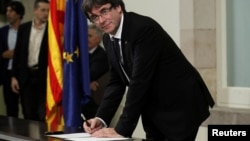Dinner at the Barcelona home of Catalonia-born Montserrat Armisen, an independence supporter, can be a tense affair.
“He criticizes us and doesn't let us eat in peace,” said Armisen of her husband, Gustavo Gomez, a Colombian who favors keeping the Spanish state intact, and their children, Jordi, 18, and Nicolas, 27.
“We go to our protests, return and don't say anything, but he just carries on,” said Armisen, 55. “It bothers us because there is no respect for us from his part.”
For many in Spain, the Catalonia crisis that threatens to fracture the country is also tearing at ordinary families and evoking painful memories of Spain’s 1936-39 civil war.
Divisions across Spanish society
The prospect that Catalonia, a former principality which prides itself on its distinct language and culture, might break away has created divisions across Spanish society, from the kitchen table to the soccer pitch.
Many in Spain regard Catalan secessionists as a noisy minority whose national identity is built on a misreading of history, ungrateful to a Spanish state that has underwritten the region’s peace and prosperity.
In their turn, some secessionists decry unionists as “fascists,” harking back to dictator Francisco Franco, who suppressed Catalan language and traditions after his forces won the civil war until his death in 1975. Most Catalans backed the Republican side against Franco.
Small groups of far-right activists have taken part in recent anti-independence protests, with a few giving fascist salutes or carrying the flag of the Falange, the dominant party under Franco.
Deepest, most painful wounds
Neo-fascists are disowned by the vast majority of those who want to keep Spain intact but their appearance in public shows how the Catalonia crisis has reopened some of Spain’s deepest and most painful wounds.
“If I say things I am called a fascist,” said Armisen's husband, Gomez, 58, who has lived in Barcelona with his family for a decade.
“Telling them they should not be independent is not being a fascist. Everything that has been done, in my view, is completely illegal,” he told Reuters Television, adding that his wife had even asked him to leave home — something she denies.
“What am I doing here?” Gomez asked, holding back tears.
‘So Franco’
Catalan leader Carles Puigdemont had pledged to proclaim the region’s independence from Spain after Catalans defied a ban and police crackdown and, according to his government’s count, voted
overwhelmingly to break away in an Oct. 1 referendum.
But, in a speech to the Catalan regional parliament on Tuesday, Puigdemont stepped back from a formal declaration of independence, claiming a mandate to launch secession but saying he would delay doing so to allow time for talks with Madrid on the region's future.
Spanish Deputy Prime Minister Soraya Saenz de Santamaria savaged Puigdemont’s speech, saying he should come back to the path of the law if he wanted talks with Madrid. She said the Spanish cabinet would meet on Wednesday to discuss its response.
On Monday, Pablo Casado, a spokesman for Spain’s ruling Popular Party, recalled that 83 years ago, the then Catalan leader, Lluis Companys, was jailed for declaring a Catalan state. He was executed by firing squad in 1940 during Franco’s rule.
Soccer can't avoid crisis
Casado said anyone who declared independence might end up like Companys, in prison.
In response, the pro-independence Catalan CUP party said on Twitter: “Thanks for being so Franco, Pablo Casado,” using a play on the Spanish word for “frank” and “Franco.”
The dispute has touched Spain's sacred pastime, soccer.
On the day after the referendum, the Spanish national team's Catalan defender, Gerard Pique, an independence supporter, was jeered by fans as he trained with the team.
Trade unions are also divided.
The Catalan arm of one of Spain's biggest unions, Comisiones Obreras (Workers’ Committees), initially backed calls for a general strike in Catalonia on Oct. 3 in response to the police crackdown on the referendum, according to media reports.
Union alters approach
But at a national level, Comisiones Obreras and another big union, the UGT, later said their Catalan affiliates would not take part in the strike, only protests against the crackdown.
“In no case are we going to support positions that give cover to a unilateral declaration of independence,” they said in a joint statement.
Rosa Borras, 47, took part in a demonstration in favor of national unity in Madrid last weekend. Thinking of her relatives in Catalonia, the situation is deeply saddening, she said.
“I’ve come because I feel very Spanish and it makes me very sad what’s happened,” she said. “I wanted to be here for unity, because I also feel very Catalan.”





